Ben Jailer expains about fishing with a friend and how the fishing takes a predictable path but might this be the time for a change?
As anyone who followed English cricket in the '90s will know: it’s the hope that kills you. The Ashes were particularly painful where we lost eight series in succession between 1989 and 2002. Yet, despite the fact that for every McCague, Such and Lathwell, the Aussies had a McGrath, Warne and two Waughs, I always went into each Ashes series convinced that somehow this one would be different.
The need to protect myself from the life-sapping inevitability of another series defeat, led me to create ‘The Aussie index’, which went something like this: however many runs we make batting first, Australia will get double; and however many runs the Aussies get batting first, we will get half.
‘The Aussie Index’ was a simple formula intended to stop myself getting too carried away when England posted a respectable first innings total of three hundred or bowled Australia out for under two hundred - only to see my hopes crushed as Australia scored over six hundred declared or skittled us out for under one hundred.
It was the mathematical equivalent of Prozac, regulating my wildly swinging moods between the giddy heights of my initial optimism as the series began, and plunging the depths of despair following the inevitable shellacking.
One step beyond
The reason I’m thinking of ‘The Aussie Index’ is I’m fishing with my mate Simon at the Barrow Tanks off the A38 outside Bristol. Simon and I used to work at the same retirement community in Bristol where Simon was a chef in the nursing care home.
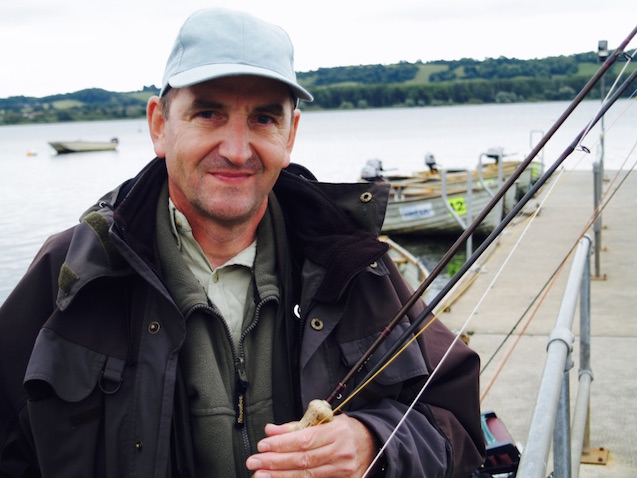
You know how it is when someone finds out that you fish and says: “I know someone who fishes, you should meet then.” Unfortunately, they never distinguish between how, where or what they fish for. Inevitably you find yourself having an awkward discussion with a maggot-dangler or some nutter whose idea of fun is to sit in a tent all weekend surrounded by more technology than a NASA engineer.
Happily in this instance Simon turned out to be not only a fly fisherman who regularly fished Bristol waters, but he was also a very talented one. He’s great fun to fish with; a fountain of knowledge who’s always willing to share his flies and he’s one of the nicest guys I’ve ever met.
The only chink in our burgeoning bro-mance is that he always catches more fish than me. Now I know fishing is all about the company and it’s the taking part, not the winning that counts blah, blah, blah… But just for once I’d like to out-fish him. However, in cricketing parlance he’s Australia, I’m England and the year is always 1989.
The difference between success and failure at the Tanks can be the as little as the distance between the concrete steps that act as casting platforms. On this particular day, I was occupying the ‘hot step’ on the causeway opposite the house on Tank number two. I’m three fish up on Simon plus a couple lost in the weed bank in front of me and he hasn’t had a touch. I’m getting cocky. My hopes are soaring. Perhaps this is finally the day I out-fish him.
It’s probably at this point that I should have applied The Aussie Index, because after the causeway goes quiet, Simon suggests a move to the gate on Tank number one and he ends up with seven fish, while I don’t get another touch for the rest of the session. You can almost hear Shane Warne screeching from the balcony at Trent Bridge, dancing with a stump held in both arms over his head and wiggling his hips like a part-time stripper sponsored by Greggs.
But what is it that separates the Warnes from the Suchs or the Jaillers from the Pages and how the hell does he always manage to catch more fish than me? To find out I meet up with Simon a few weeks later where we take a boat out on Chew Valley.
Friend request
To prepare for the day’s fishing I take a quick look at the Bristol Waters’ fishing forum and discover that the fish at Chew have been taking bloodworm. Beyond that I throw my gear in the car, hoping that a few tried and tested methods will eventually put me onto a fish. It’s the equivalent of what passed for preparation for a county cricketer in the '80s, which consisted of a few throw-downs in the nets before going out to face the likes of Malcom Marshall, Michael Holding, Colin Croft and Sylvester Clarke.
I soon discover that Simon takes a more fastidious approach to his day’s fishing; more akin to a modern day test player, leaving nothing to chance with their laptops, visualisation techniques and a whole backroom of specialist coaches. To ensure that he’s got the absolute latest information on how Chew is fishing, Simon even admits to sending a friend request to someone on Facebook who’d posted that they’d fished the reservoir the day before.
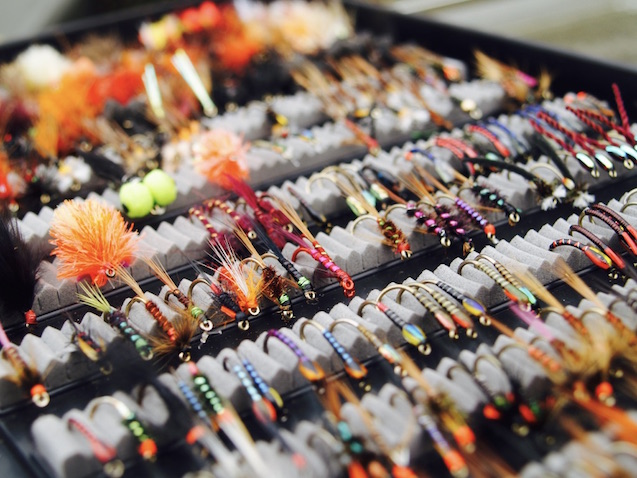
“You need to find out as much information as you can,” he says. “Who’s catching what, what they’re catching on and where the fish are. Sometimes good information is hard to come by; people will tell you all kinds of porkies to put you off the scent. But you get to know people: who the good fishermen are and which ones fish Chew regularly. If you follow them, they’ll soon put you on the fish. Also make sure to take a note of their boat number and keep an eye out for them on the water.”
Jersey Herds
With clouds overhead and a NNW producing an enticing ripple, conditions look perfect. However, after a number of fruitless drifts along North Shore and the Dam area we head for Morton Bay. During the fifteen minute ride across the reservoir, Simon talks about his introduction to fly fishing.
Simon’s dad was Peter Page who both fished for and managed the England fly fishing team. He was also chairman of Kennick Fly Fishers and fished with Bob Church and Chris Ogborne. “I was about nine when I first went out fishing,” Simon tells me. “My Dad thought that was a good age to handle a fly rod.
“He took me onto the River Dart and said “This is what you do”. First cast, my fly landed on the water, I allowed it to swing and had a fish. I thought that was fantastic and from that day on I never looked back.”
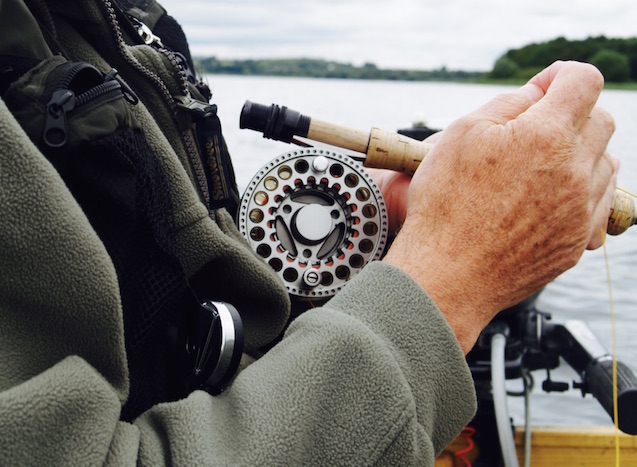
Living in Devon, Simon and his dad fished the local reservoirs and one of his fondest memories is of them fishing Siblyback when they caught 48 fish between them on Jersey Herds. It was there that Simon learnt to cast, also practising in the garden or a field at the back of their house whenever he had any free time.
“It was always practice, practice, practice and learning as much as I could. Even today I still learn a lot from other people. Fishing is one of those sports when you never know it all. Being able to tie your own flies is also a magical thing. To create something that a fish comes along and eats is great achievement.”
Confidence flies
As we navigate the weed beds in Roman Shallows, Simon notices a cluster of boats anchored up tight off the reed beds in Stratford Bay. We soon spot that there are rods bending and set up a drift.
After our first drift we discover that the fish are shoaled in one particular area and hard on the bottom in about five feet of water. We now know where the fish are, but where I’m constantly swapping flies to find the magic one that will get me my first fish, Simon sticks with the same three flies all day: a tequila blob on the point, a booby on the top dropper, and a red holographic Diawl Bach in between.
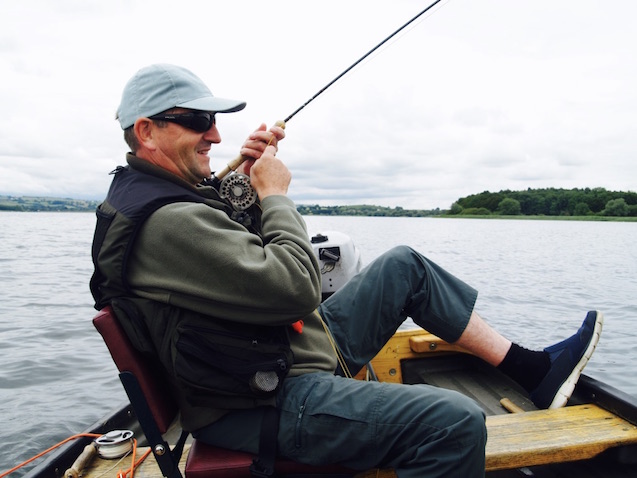
“We all have confidence flies,” he explains. “It’s important to have flies that you know will catch you fish and there are ones I fish with at the Barrows that I wouldn’t be without. That way you know it’s not down to bad fishing if you blank - it’s just how it was.” Needless to say it’s Simon who nets the first fish, while I’ve got my hear buried in one of my fly boxes.
Robocop
It isn’t until I playback the interview I recorded with Simon in the boat that I notice the sound in the background:
Swish, swish, fizzzzzzz.
Strip-strip-strip-strip-strip-strip-strip.
Swish, swish, fizzzzzzz.
Strip-strip-strip-strip-strip-strip-strip.
Simon’s casting and retrieve is as regular as a metronome. He’s relentless. Machine-like. Robocop in a fly vest. Although instead of clearing a dystopian Detroit of crime, Simon is clearing out Stratford Bay of rainbow trout.
This same relentlessness is applied to our fishing, as we go over and over the fish on the same drift. “Sometimes you think “shall I move on and see if there’s anywhere better?”, he says. “But we’re succeeding in what we’re doing, so let’s stay where we are.”
Slower than slow
An hour of repeating the same drift across Stratford has got Simon three fish, but he knows something isn’t right. He’s confident in his choice of flies, he knows there are fish here, but he isn’t catching them.
“You have to be prepared to change tactics, change flies or lines until you find something that works for you,” he says. “It’s so important with fly fishing to adapt - you have to chop and change to find the right tactics for the day. Sometimes it’s hard when you’re halfway through day and you think that you can’t be bothered, but you have to do it.”
Simon’s eureka moment comes when he slows down his retrieve to barely moving his flies along the bottom. He keeps on repeating the mantras “slower than slow” and “slow, slow and slow again.” It soon gets ridiculous as he brings in what seems like a fish a cast. “You have to try to and work out what the fish want,” he says. “Some days they will chase flies, so give it good strong pull. On other days they want it slow. Then there’s dead slow.
“Today it’s a been dead slow figure of eight with an occasional pull to entice any fish that’s following to take the fly. If you’re doing a figure of eight retrieve and give a couple of pulls, the fish will normally take it.”
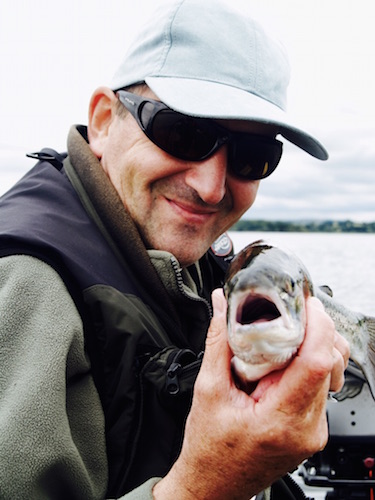 And the result? Simon nets a baker’s dozen to my solitary one.
And the result? Simon nets a baker’s dozen to my solitary one.
A class act
This was never going to be a case of applying ‘The Aussie Index’, as applying the last rites. Many years ago my village cricket team was invited to Lords for a coaching session and I found myself batting in the nets against Angus Fraser. Despite being categorised as a fast-medium bowler, I’m sure Angus will forgive for saying that he wasn’t exactly renowned for his blistering pace.
Never short of self-confidence, I actually found myself looking forward to testing myself against an ex-England test player. Yet I didn’t see any of the four balls he bowled at me before one of the coaches took pity on me and escorted into the net where some juniors were bowling. Sometimes you just have to hold up your hand up and accept that someone is in a different class.
It’s approaching 6pm and it’s time to motor back to the jetty. “The best advice I was ever given by my dad was practice and just enjoy it,” says Simon. “There’s always going to be days when you don’t catch any fish, but there’s lots more to fishing than just catching.
“We’re surrounded by beautiful countryside, it’s been lovely to watch the birds flying around, see the change of seasons and at any moment you might just get the fish of a lifetime on the end of your rod.”
The Analyst
In his excellent book, Who Wants to be a Batsman, Channel 5’s analyst Simon Hughes looks at the DNA of the greatest batsman ever. There are those such as Donald Bradman or Sachin Tendulkar who oozed natural ability. Then there are the likes of Kumar Sangakkara who, far from being a teenage prodigy, scaled the cricketing heights through “assiduous observation and painstaking practice.” But most importantly, to succeed as a batsman, Hughes concludes that “you have to love batting.”
Annoyingly, my Simon seems to have a foot in each camp: a natural born fly fisherman with both the desire to constantly improve through practice and an unquenchable thirst to learn as much as he can about it. I’ve basically been bowling at Don Bradman’s and Kumar Sangakkara’s love-child and wondering why I keep going for 36 an over.
“Do you love fishing?” I ask Simon.
“I love out-fishing you,” he replies, laughing.
Bastard.